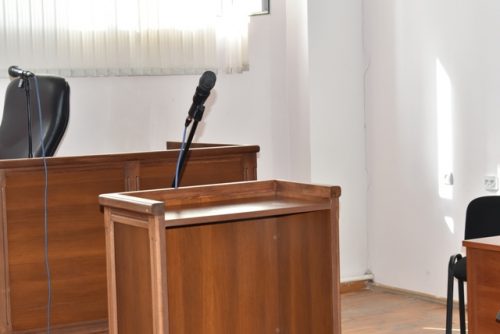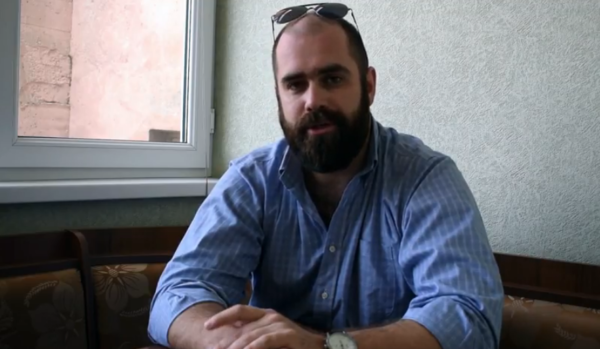In 2019, a Yerevan resident applied to HCA Vanadzor and informed that policemen had transferred her daughter to a psychiatric hospital and the case of assigning compulsory treatment would be examined in Yerevan Court of General Jurisdiction. On the same day, HCA Vanadzor applied to the Court and informed that with the involvement of advocate Tigran Hayrapetyan, the Organization would provide protection of N.G.’s rights in Court (the citizen’s first and last names are changed).
During the outgoing court hearing in the National Center for Mental Health Care in 2019, examining the civil case according to the center head’s application in regard to subjecting N.G. to involuntary treatment in the center, the Court upheld the application for one month, i.e. until 27 January 2020 included.
- G.’s family and one of the owners of an apartment in the same building have a long story of unfriendly relationship, and even a quarrel between them was investigated in the police. The neighbour’s apartment tenants negligently and carelessly flooded N.G.’s apartment on a regular basis and damaged it. Moreover, the tenants also regularly made noises by thus aggravating their already tense relationship.
N.G. and the tenant had a quarrel after the ceiling of the apartment got flooded once again and the tenants made noises. But despite this, it was the owner of the apartment who called the police. She told the police that N.G. “had a mental health problem”, that she was dangerous for those around her, and asked to regulate the issue of her inpatient treatment.
The Police apprehended N.G. to the police division and then the ambulance car involuntarily transferred her to the National Center of Mental Health Care with “acute affective delirium” preliminary diagnosis. The next day, the medical commission concluded that , “Based on delirium motives, N.G.’s behaviour impedes the work of state entities, disturbs the rest of the neighbours and provokes by creating conflict situations, which is dangerous for herself and others around her. It is necessary to apply to Court in order to get a permission on compulsory treatment”.
On 23 December 2019, the Head of the Center applied to General Jurisdiction Court of Yerevan on the issue of N.G.’s enforced treatment in the center.
In particular, he mentioned that “when being accepted to the center, the citizen was suspicious, expressed affective thinking, ideas of reference and persecutory thoughts, around which she had no judgment, she disturbed her neighbours’ peace and created conflict situations. She has no criticism of her illness and she needs compulsory hospitalization and treatment”.
During the outgoing hearing in the Center in December 2019, the Court made a judgment to subject N.G. to compulsory treatment.
Advocate T. Hayrapetyan, who was involved by HCA Vanadzor as the defender of N.G.’s interests, made an appeal complaint to the Civil Court of Appeal, claiming to overturn the lower court judgment of December 27. Hayrapetyan finds that the citizen is deprived of the possibility to appear before the Court immediately after the enforcement due to a legislative gap. Such a provision is in place for arrestees, but not in this case. That is why N.G. was presented to the judicial body only in 5 days after being transferred to the center.
In the appeal, the advocate stated a number of substantiations, finding that for the fair and effective examination of this case, the Court did not take into account a number of important factors that could have influenced the outcome of the case. Referring to Article 268 (2) of the RA Civil Procedure Code, the advocate mentioned that the involuntary treatment of the citizen was conducted by violation of legislative procedures. It was also mentioned in the complaint that the Court was to have grounds not contrary to legislation, while, in this case, the procedure of compulsory treatment was violated. According to the RA Law “On psychiatric care”, a person may be subjected to compulsory treatment only in 2 cases, i.e. when a person is dangerous to himself or others, and when not conducting or stopping the treatment may deteriorate that person’s mental health. The court did not take into consideration this law, Article 27 of the RA Constitution and Article 5 of the European Convention of Human Rights.
In addition, the advocate also invoked observations of the European Court in similar cases. According to them, the minimum required condition is that the fact that a person has mental health problems must be substantiated, that is, the problem is to be confirmed before the authorized body by objective medical expertise.
In this case, the preliminary diagnosis was given by the ambulance doctor, while nothing is known in regard to N.G.’s examination. Besides the preliminary diagnosis not confirmed by the medical commission on 23 December 2019, no medical conclusion was given on her mental health. Whereas, according to Article 18 of the same law, there should have been an inpatient examination or conclusion on treatment; according to Article 19, there should have been a description of psychiatric aid; and according to Article 22, there should have been a professional substantiation by the commission. Ultimately, it is not clear whether the preliminary diagnosis is included in the international classification of mental health problems or not. In this sense, all the requirements of the law were violated.
It turns out that the conclusion presented to the Court by the Center’s psychiatrists has no professional analysis, they have not conducted any professional examination in order to confirm the preliminary diagnosis and have not concluded as to what mental health problem N.G had. Instead, there are conclusions that she impedes the work of state bodies, disturbs her neighbours, creates conflict situations, which is dangerous for herself and for those around her.
The mental health center was to justify why there was a need for N.G.’s compulsory treatment, instead of outpatient treatment. According to Council of Europe Recommendation on the legal protection of persons suffering from mental disorder, a person may be placed in the institution only in case he/she is seriously dangerous to herself/himself and others due to the mental health problem. In this case, the Court did not substantiate that N.G. was dangerous for those around her, as there is no conclusion on it in the judgment. The Court simply based on the psychiatric hospital’s conclusion that impeding the work of state bodies or disturbing her neighbours’ peace, N.G. presents serious danger to herself and those around her. This conclusion has no sensible reasoning and based on this, the judicial act is apparently groundless. Moreover, the Court did not assign an expertise to find out if the doctors’ conclusion was credible.
The advocate claims that these are the gross mistakes that are made in similar cases: doctors give a legal conclusion, the Court gives a medical conclusion, while the reverse should be done and the Court must decide whether the relevant person is dangerous for the society. Not having legal knowledge, the doctors considered N.G.’s application to the law enforcement body as a threat to society, which hinders the work of law enforcement bodies, while the Court, thinking that it should base on medical conclusion, repeated the same nonsense in the judicial act. However, writing an application (even an absurd one) to the Prosecutor’s Office is far from being a threat to society.
Only the Court can make a conclusion on being dangerous for society. Therefore, the only conclusion of the case has no professional grounding and does not correspond to requirement-standards of the European Court. It is noteworthy that such substantiations were made during the trials, but the Court did not touch upon them and there is even no mention of those substantiations in the judgment. Instead, the Court pointed out an apparently false circumstance, that N.G.’s representative recognized that his truster had mental health problems.
Concluding the appeal, T. Hayrapetyan noticed that the Court violated Article 3 (3), Articles 18, 19 and 22 of the RA Law “On psychiatric care”, as well as Article 5 of the Convention, which affected the outcome of the case. Thus, the advocate requested the Civil Court of Appeal to fully overturn the judgment.




